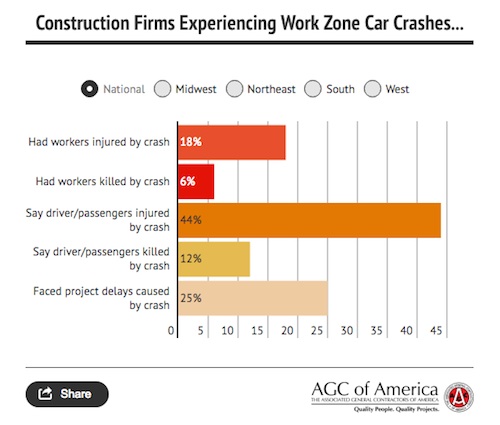New data shows 39 percent of road contractors suffered car crashes in work zones.
AGC calls for better safety measures.
 Thirty-nine percent of highway contractors reported that motor vehicles had crashed into their construction work zones during the past year, according to the results of a new highway work zone study conducted by the Associated General Contractors of America.
Thirty-nine percent of highway contractors reported that motor vehicles had crashed into their construction work zones during the past year, according to the results of a new highway work zone study conducted by the Associated General Contractors of America.
Association officials urged summer travel motorists to stay alert while driving through work zones, noting that highway workers are in danger and drivers and passengers face an even higher risk of being hurt or killed in work zone crashes.
“Any time your job site is just a few feet away from fast moving traffic, danger is never far away,” said Jeff DiStefano, the chief executive officer of Harrison & Burrows Bridge Constructors in Glenmont, N.Y. and chairman of the association’s Highway and Transportation Division. “The easiest way to improve work zone safety is to get motorists to slow down and pay attention.”
DiStefano said that 44 percent of contractors who reported work zone crashes on their projects said that motor vehicle operators or passengers were injured, and 12 percent of those crashes involved a driver or passenger fatality. Highway work zone crashes also pose a significant risk for construction workers, DiStefano noted. He said 18 percent of work zone crashes injure construction workers and 6 percent of those crashes kill them.
Work zone crashes also have a pronounced impact on construction schedules and costs, DiStefano said. He noted that 25 percent of contractors reported that work zone crashes during the past year have forced them to temporarily shut down construction activity. Those delays were often lengthy, as 51 percent of those project shutdowns lasted two or more days.
Association officials said that a majority of contractors (77 percent) report that motor vehicle crashes pose a greater risk today than they did just ten years ago. Meanwhile, 72 percent of contractors report that having positive barriers – including Jersey barriers – between workers and moving traffic can save lives and prevent injuries. Yet the Obama administration has yet to implement a barrier funding requirement that was included in the most recent surface transportation law from 2015.
“Turns out an orange cone is no match for a speeding car, and it shouldn’t take a needless fatality to figure that out,” said DiStefano. He added that the association was urging the administration to move forward on requiring and funding, safety barriers for highway projects as quickly as possible.
But DiStefano suggested that the best way to improve safety was for motorists to slow down and be more careful while driving through highway work zones. “When you see construction signs and orange barrels, take your foot off the gas, get off the phone and keep your eyes on the road,” he added. “It is not worth putting someone’s life at risk just to save a few seconds on the road.”
The work zone safety study was based on a nationwide survey of highway construction firms the association conducted in March and April of this year. Over 800 contractors completed the survey nationwide.
Click here to view the national, regional and state highway construction zone survey results.
Click here to view the video.
















